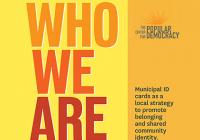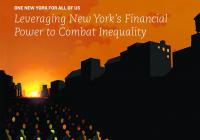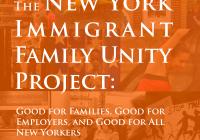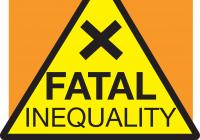Publication -- do not use
One of the paradoxes at the center of the struggle for immigrant rights in the United States is that while immigration law and policy is made at the national level, most of the impacts of those laws occur at the local level. Politicians and bureaucrats in Washington, DC, negotiate and renegotiate a statutory framework that includes some and excludes others, and design and redesign a police apparatus to enforce the framework. Meanwhile, in towns and cities across the country, immigrants and the neighborhoods they are part of experience firsthand the difficult realities of trying to live, work, take care of a family, and participate in community within a set of legal structures that do not always protect their basic rights and freedoms.
New York is among the most unequal cities in the US. This inequality has become the most pressing issue in New York City and New York State. The good news is that New Yorkers are demanding action — and there’s a clear path to real, practical alternatives that can make New York fairer, more livable and more prosperous. One key set of solutions will come from renegotiating the relationship between New York City government and Wall Street. New York City and its pension funds control $350 billion that travel through the financial system. That money gives the City the leverage to renegotiate our relationship with Wall Street so that it serves the public interest.
Each year, thousands of New Yorkers — parents, siblings, employers, workers and students — face detention and the possibility of deportation without the assistance of legal counsel. These New Yorkers are isolated from their loved ones and confront the possibility of long-term and, in some cases, permanent separation from their communities. This analysis demonstrates that New York State can dramatically reduce the emotional and economic cost of the detention and deportation system by providing high-quality legal counsel for detained immigrants who are facing deportation through the New York Immigrant Family Unity Project (NYIFUP).
The construction industry is full of dangerous jobs. Smaller companies often have particularly unsafe workplaces – they tend to be non-union and lack the necessary training, proper equipment, and respect for workers’ reports about unsafe conditions. Workers of color disproportionately face construction dangers because they work in construction in relatively high numbers, they are concentrated in smaller, non-union firms, and they are over-represented in the contingent labor pool. Our review of 2003-2011 OSHA investigations of construction site accidents involving a fatal fall from an elevation revealed that Latinos and immigrants are disproportionately killed in fall accidents.
A compendium volume of 15 policy briefs from Local Progress on the following issues: Paid Sick Leave; Community Benefits Agreements; Creating Green Jobs; Living Wage Ordinances; Livable Cities; Addressing the Foreclosure Crisis; Strengthening Public Schools; Banning Housing Discrimination; Ending Drug-related Evictions; Policing and Civil Rights; Detainer Discretion; Language Access; Immigrant Confidentiality Policies; LGBT Civil Rights; Expanding Voting Rights
The state government provides New Yorkers with a multitude of services and benefits necessary for their survival and success: nutritional supports, health benefits, unemployment insurance and driver’s licenses, to name but a few. In order for these services to be equally accessible to all of the diverse residents of the state, it is essential that government agencies be linguistically accessible, providing interpretation and translation services for the over 2 million individuals in New York State who are limited English proficient (LEP).
Beginning in 2012, car wash workers across New York City are rising up and demanding living wages, predictable schedules, and protective gear against harmful chemicals from their employers and from industry giant John Lage. Based on first-hand observations by workers themselves, this report details workers voting to unionize, win decent wages, and live with dignity on the job. Follow the continued struggles of the Wash New York campaign, led by workers and their allies, as they illustrate the policies that New York City can adopt to improve the quality of jobs in the car wash industry.
Five years after the housing market collapsed, California’s economy remains weak. The unemployment rate is nearly 10 percent, twice what it was in 2006, and in 2012 the State’s underemployment rate averaged an astonishing 19.3 percent.The continuing housing crisis remains a key cause of this widespread economic tragedy. Nearly two million California homeowners are underwater, owing more on their mortgage than their home is worth.
Something unique has happened in New York: a wave of low-wage worker activity. As is clear from this report, New York City is at a critical turning point: will the City be one where all working families can find stable, living-wage employment? Or will the entrenched inequality of the City worsen still further? This report captures the inspiring stories of low-wage workers who have put these issues in the spotlight, organizing for improved conditions in industries ranging from car wash to fast food to retail and beyond.
Pages
- « first
- ‹ previous
- 1
- 2
- 3
- 4



















